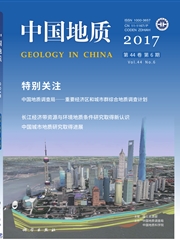

 中文摘要:
中文摘要:
南秦岭西茬河、五龙印支期岩体侵位于中元古代佛坪群变质岩,在五龙岩体南部发育一些暗色包体,它们和寄主花岗闪长岩界限明显或呈渐变关系。笔者对两岩体的岩石学、地球化学、Sr-Nd同位素年代学进行了详细研究。研究结果表明,西茬河与五龙花岗质岩具明显似埃达克岩的地球化学特征:强烈亏损重稀土元素Yb、Y;富集Sr、Ba,高Sr/Y和Y/Yb比值:Eu微弱负异常。表明源区以石榴石、角闪石为主,有少量斜长石。暗色包体富Mg(MgO=4.15%~8.13%)、Cr(14.8μg/g-371μg/g)、Ni(20.0μg/g-224μg/g)及轻稀土和大离子亲石元素,推测起源于地幔组分。两岩体的Sr-Nd同位素组成类似,(^87r/^86Sr)i=0.70445-0.70645,εNd=-1.50~-3.62,TDM=1.02-1.38Ga。结合前人的研究,笔者认为:西茬河、五龙岩体可能是由幔源岩浆底侵于壳幔边界,诱发增厚的基性下地壳达到含角闪石的榴辉岩相或麻粒岩相发生部分熔融形成的埃达克质岩浆。两岩体在部分微量元素含量的差异是由受地幔物质混染程度不同造成,其形成代表了秦岭造山带印支期后碰撞造山阶段勉略洋俯冲板块的断离作用。
 英文摘要:
英文摘要:
The Early Triassic Indosinian Xichahe and Wulong plutons were emplaced into metamorphic rocks of the Mesoproterozoic Fuping Group in the South Qinling. A few mafic enclaves, which have a clear or obscure boundary with the host granodiorite, occur in the southern part of the Wulong pluton. Intensive petrographical, geochemical and Sr-Nd isotope studies indicate that the two plutons show some adakitic affinities:they are both strongly depleted in Yb and Y and enriched in Sr and Ba with higher Sr/Y and Y/Yb ratios and weak negative Eu anomalies. These patterns suggest a feldspar-poor, garnet ± amphibole-rich fractionation mineral assemblage. The mafic enclaves have higher Mg (MGO=4.15-8.13%), Cr (14.8-371 μg/g) and Ni (20.0-224 μg/g), as well as higher LREE and LILE, with Nb/Ta ratios of 15.42-21.9. It is inferred that the underplated mantle magma was responsible for the generation of the mafic magmas. The two plutons have similar Sr and Nd isotopic compositions, with (^87Sr/^86Sr)i =0.70445 -0.70645, εNd=-1.50-3.62 and TDM=1.02-1.38 Ga. Based on the aforesaid study, combined with previous studies, the authors think that the underplating of mantle-derived magma to the crust-mantle boundary induced amphibole eclogite facies or granulite facies metamorphism and partial melting of the thickened lower crust, thus forming adakitic magma. The difference of the two plutons in contents of some trace elements was caused by different degrees of contamination with mantle materials, and their formation probably represents the breakoff of the subducted Mianlue oceanic slab during the Indosinian lateconisional orogenic stage in the Qinling area.
 同期刊论文项目
同期刊论文项目
 同项目期刊论文
同项目期刊论文
 期刊信息
期刊信息
